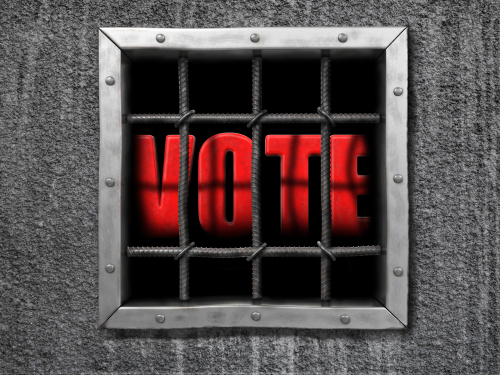Afternoon Briefs: Iowa governor lifts ex-felon voting ban; gun licensing challenge reinstated

Image from Shutterstock.com.
Iowa governor restores voting rights for many ex-felons
Iowa Gov. Kim Reynolds on Wednesday signed an executive order restoring voting rights for many felons who have completed detention, probation and parole. The Iowa Constitution bars felons from voting but gives Reynolds the power to restore voting rights. Reynolds, a Republican, said she will continue to sign orders restoring those rights on a daily basis. Reynolds’ orders won’t apply to people convicted of murder and manslaughter; those felons will have to submit individual applications to have voting rights restored after completion of their sentences. Iowa was the last state to ban voting by former felons. (The Des Moines Register, Reynolds’ press release, the executive order)
4th Circuit revives suit challenging handgun licensing law
The 4th U.S. Circuit Court of Appeals at Richmond, Virginia, on Monday reinstated a lawsuit that alleges that Maryland’s handgun licensing law violates the Second Amendment. The law requires people buying guns to complete four hours of safety training. The 4th Circuit ruled that one of the plaintiffs, Atlantic Guns, had standing to sue. (The Associated Press and the Volokh Conspiracy via How Appealing, the 4th Circuit decision)
2nd Circuit blocks public charge rule in 3 states
The 2nd U.S. Circuit Court of Appeals at New York on Tuesday blocked the Trump administration’s public charge rule in New York, Connecticut and Vermont, the three states that sued over the policy change. The rule makes it more difficult for immigrants to get legal residency if they receive or are likely to receive government assistance. In April, the U.S. Supreme Court refused to block the rule during the litigation, which means that the 2nd Circuit decision won’t take immediate effect, according to Law.com. (Law.com, New York attorney general press release, the 2nd Circuit decision)
New Mexico can fine businesses that flout COVID-19 orders
In a ruling from the bench Tuesday, the New Mexico Supreme Court said the state may fine businesses that refuse to comply with shutdown orders. The court ruled in a lawsuit filed by business owners after the state threatened civil penalties of up to $5,000. (Courthouse News Service)
Write a letter to the editor, share a story tip or update, or report an error.


